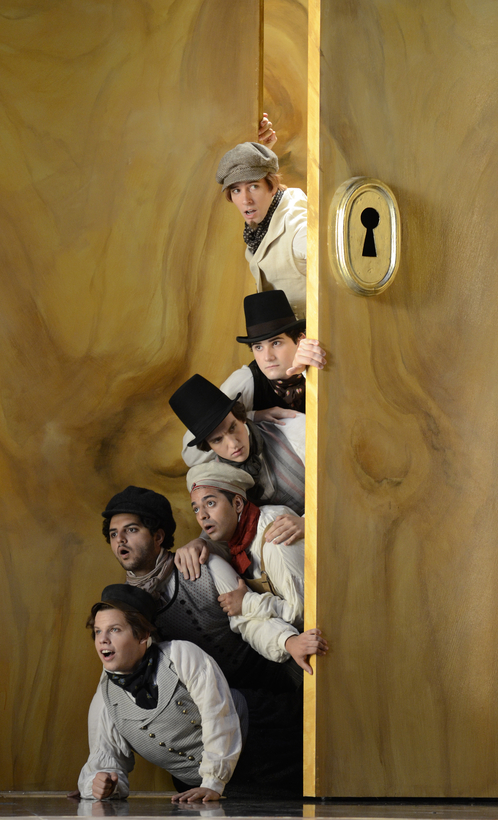There’s this nobleman, you see, who has fallen hard for a goldsmith’s daughter. Providentially, her hand in marriage is up for grabs in an impending song contest. But the nobleman’s rock-star style is at odds with the judges’ rules and traditions.
There, in a nutshell, is the story of Die Meistersinger von Nürnberg (The Master Singers of Nuremberg). Intended as a sort of mid-career break from the weighty mythologies for which Richard Wagner was famous, the composer-librettist’s only comedy grew and grew to a running time of better than five hours.

Longer operas have been written than this one, but not many and none you’re likely to stumble across; Guinness World Records lists Die Meistersinger as the longest opera “commonly performed.” To the uninitiated, that may not sound like much of a recommendation. But devotees of Tristan und Isolde, Parsifal, and the tetralogy Der Ring des Nibelungen come to every revival in a state of keenest anticipation.
The Salzburg Festival production of August 2013, mounted by the Norwegian cult director Stefan Herheim in all-but-Dickensian detail, had audiences over the moon. In 2016, it transferred to the Paris Opera, with equal success, but plans to bring it to the Met fell apart over design issues—whereas the Salzburg stage is very wide but not high, the Met’s is very high but not wide. Happily, we have live video from Salzburg, with Daniele Gatti leading the resplendent Vienna Philharmonic.

When an opera has an overture, it’s common today—some might say de rigueur—for directors to stage it. Herheim plunges us into the action before we hear a note. Roused from dreams, an odd duck in nightcap and nightgown bursts into a study littered with a scholar’s books but also with children’s toys and an empty cradle, throws himself to work at a pretty drop-front Biedermeier desk tucked in the corner, and in a sudden blaze of C major we’re hearing what he’s hearing. Thus the prelude begins, 10 minutes of majestic contrapuntal bustle during which we see that desk expand to fill the entire stage. In the three acts ahead, the cast of dozens upon dozens will frisk across the writer’s work surface like figurines come magically to life, bursting with all the same outsize passions and foibles as big people, or maybe even more.
Scene stealers all, they have no end of stuff to work with. Everywhere you look, details of décor, props, dress, even hairstyle fit tight with Wagner’s words and thinking, though not always in the ways those who have grown up with the score might expect. Only in the street fight at the end of Act Two does Herheim’s invention go off the rails; set to a colossal double fugue, the scene here devolves into a general orgy with gonzo guest appearances by Kermit the Frog, on leave from “The Muppets,” and Walt Disney’s formerly virginal Snow White.

Though Gatti builds this climactic episode like a cathedral, his reading might not, on strictly musical grounds, be your desert-island Meistersinger. In the sun-drenched quintet in Act Three, the tempo drags, with unfortunate consequences for the singers. That said, the whole here is much more than the sum of the parts. Anna Gabler is picture-perfect as Eva, the goldsmith’s dreamy yet strong-willed daughter. As Beckmesser, a pedantic hometown fuddy-duddy determined to make her his, the trim, supercilious Markus Werba cuts a figure of unusual elegance. Too bad that Roberto Saccà’s Walther von Stolzing, Eva’s choice, comes up short on romance.
But then, his is not the personality around whom Die Meistersinger revolves. That would be the goldsmith’s next-door neighbor, the cobbler and poet Hans Sachs—the dreamer we first met scribbling in his nightgown. Kindly and gruff by turns, he has loved Eva since she was a little girl, and she loves him. Though he could ace out Stolzing in a heartbeat, Sachs instead befriends him and steps aside. In a Golden Age going on a century ago, the legendary Friedrich Schorr conveyed the complexities of Sachs’s heart and mind not only in words but also in the sheer eloquence of his voice. By comparison, the reigning Sachs of the current generation, Michael Volle, is pretty much talking on pitch. But as an actor, Volle absolutely owns the part.
Die Meistersinger von Nürnberg is available for streaming on Carnegie Hall+
Matthew Gurewitsch writes about opera and classical music for AIR MAIL. He lives in Hawaii

